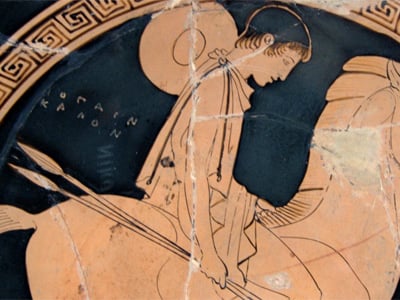Palestine and the Peloponnesus
The chronic violence in Gaza has a parallel in the ancient struggle between Sparta and Athens.
 At some point, Hamas and Israel will have had so many armed confrontations that they’ll have to stop naming the operations and just give them numbers. But don’t think these future conflicts will be indistinguishable from what’s happened so far. At some point, these flare-ups could get worse—a lot worse.
At some point, Hamas and Israel will have had so many armed confrontations that they’ll have to stop naming the operations and just give them numbers. But don’t think these future conflicts will be indistinguishable from what’s happened so far. At some point, these flare-ups could get worse—a lot worse.
Serious Standoff
So far the duels between the Israeli military and Hamas and other armed factions in Gaza have been tactical skirmishes. Neither side has had any notion that they are trying to grab some kind of decisive advantage that would change the standoff that has prevailed—and hardened—since Hamas took control of Gaza in 2007.
After all the back and forth of the last few weeks, Israel can claim that it has decimated Hamas military infrastructure and depleted its war stocks. So what? Hamas can rearm. Hamas can preen that it wrestled some concessions from Tel Aviv, that it garnered pats on the back from Egypt and Turkey and that its stock is on the rise on the Arab Street. Again, so what? The people of Gaza are still caught in the crossfire and saddled with a corrupt regime that can’t deliver peace or jobs. So the two sides are back to the status quo, but with more innocents killed and maimed on each side.
Don’t get complacent. There are plenty of reasons to worry that the stasis will not hold forever.
History Lesson
The Peloponnesian Wars were another nearly endless conflict. That ancient Greek struggle was protracted because neither side could hit at the other’s strength. Sparta could march its armies to the gates of Athens, but it couldn’t breach the walls. At the end of the campaign, all they could do was head home. Athens could sail its fleets to Sparta’s coast, but couldn’t land troops for fear of annihilation at the hands of the Spartan infantry. So Athenian armadas sailed out and sailed back.
While today’s conflict between Israel and Palestine resembles that endless ancient war of nerves and attrition, it may not stay that way forever. And the most likely catalyst to spark change is Iran.
Iran continues to send technical, logistical and financial support to Hamas, throwing more fuel on the fire every time the embers start burning low. In the future, however, Tehran may be able to play a more decisive role than instigator-in-chief.
What happens when Iran is able to field a nuclear capability that checkmates Israel’s nuclear deterrent? Tehran doesn’t have to have a nuclear arsenal that matches Tel Aviv’s. It just has to have enough capability for the Israelis to fear that an exchange could leave them suffering as badly as the Iranians. That situation might take the Israeli nuclear capability off the table as a credible deterrent to a widespread armed conflict.
So in the future, a flare-up between Hamas and Israel might produce a very different result. Hamas might turn to other nations and ask for armed support. With regimes like Turkey and Egypt becoming much more pro-Hamas and anti-Israel, they just might get it. If those countries see the Israeli nuclear deterrent as being offset by Iran, they might be more willing to pitch in with additional materiel. This is the making for a conventional war on the scale of 1967 or 1973—but with many more conventional weapons being thrown around among much more heavily populated areas.
And who knows where it will stop? It is widely believed that, if Iran obtains nuclear weapons, so will other regional powers who will not want to be left behind. The list of next-in-line nuclear powers might include Egypt, Turkey, and Saudi Arabia. If the next conventional war in the Middle East were to break out in a “proliferated” environment, who knows where that might lead? One research study that looked at this scenario suggests this would be a highly unstable situation—to put it mildly.
Time-Bomb About to Tick
The U.S. government cannot just shake its head and continue to believe that process can substitute for progress in the Middle East. The Obama administration appears to believe that as long as we are talking, negotiating, sanctioning, showing up and sending out press releases everything will be okay. But that notion is not okay.
The dynamics in the region are changing. Rapidly. And they are changing in way that makes peace and stability more fragile while reducing the prospects for economic, religious, and political freedom to little more than a forlorn hope.
James Jay Carafano is director of the Allison Center for Foreign Policy Studies at The Heritage Foundation.
